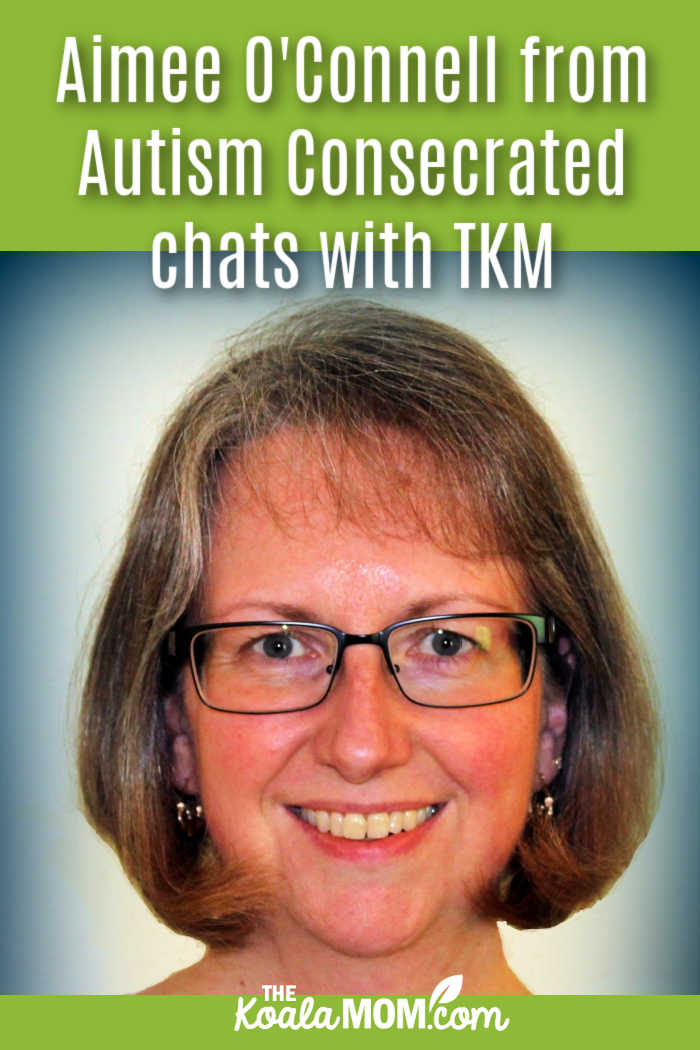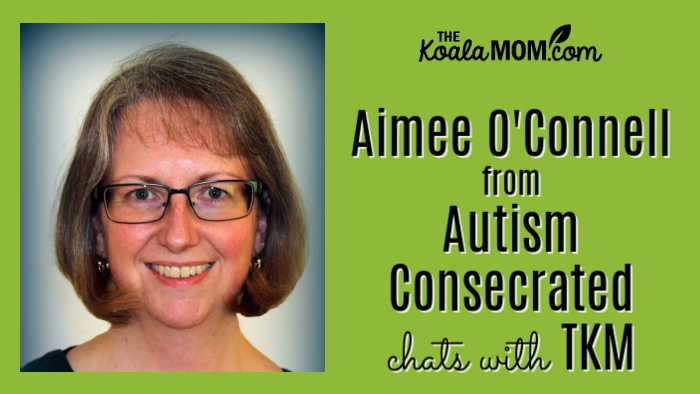Four years ago, I began to realize that the factors which made my son different than his sisters, and caused him to struggle in various situations, were not simply because he was a boy. I began researching ADHD and autism in an effort to better understand him and meet his needs. As I did so, I also began to connect with other moms in my community whose children are autistic or ADHD, and to learn more about myself and my daughters as well.
Autism Consecrated is a fantastic resource founded by an autistic priest and lay Carmelite. While my son has now been diagnosed with ADHD, I remain curious about the diverse needs and abilities each of us brings to our communities, and how we can better ensure everyone is welcome in our churches. I’m very grateful that both Father Mark Nolette and Aimee O’Connell have been willing to chat more with me about autism, faith, and their ministry (even as I revealed my own ignorance in my questions for them).

What is Autism Consecrated?
From their website:
Our Vision: To realize autism’s belonging in the Body of Christ.
The historical mischaracterization of autistic behavior as “wrong” has left many autistic adults questioning our belonging in the Body of Christ. It is hard to believe that God loves us unconditionally and intends us to be the way He designed us if our ways of perceiving, communicating and processing are constantly criticized and corrected. Society has only recently begun to acknowledge that neurodiversity is an intentional and valid way of being human. It can be disorienting to consider that maybe we do have a place in the Body of Christ without having to first cleanse ourselves of our autistic traits.
The truth is this: Autistic people are known and loved by God, exactly as we are.
The Church needs her autistic members and is incomplete without our presence.
Here’s my interview with Aimee O’Connell, autistic, lay Carmelite, neurodiversity-, trauma- and DBT-informed school psychologist, mom and wife.
TKM: First, can you tell us a bit about yourself?
Aimee O’Connell: I am 52, an only child, born and raised in upstate and Western New York. I have been married for 27 years. My husband and I have three children (now teens and young adults) whom we have homeschooled. Before our children were born, I earned my master’s degree in school psychology and worked in both elementary school and adult day treatment settings. Though I stopped working to be with the children full-time, I stay current with continuing professional development, particularly in the areas of neurodiversity and trauma recovery.
TKM: How / when were you each diagnosed with autism?
Aimee: Growing up, my teachers all made the same remarks as I rose through the grade levels: I was smart, an excellent writer, and oh-so-very-quiet. I was a model student in everyone’s eyes, but I struggled terribly with sensory overwhelm and situational mutism day after day. It was not until my adulthood that I recognized these were all clear signs of autism, and yet it still took years to finally convince my providers that my ability to do what I have done in my life has come at a very high cost to my emotional and physical health. It was a relief to finally get my diagnosis in midlife.
TKM: It’s said that if you’ve met one person with autism, you’ve met one person with autism. Can you give us a brief glimpse of what autism is like for you or how it affects your life?
Aimee: My auditory processing causes a lot of difficulty for me. I have had my hearing tested multiple times and have excellent acuity, but my retention and listening speed varies, and I struggle especially in larger gatherings with background noise and competing voices. I also need more time to consider and form words for responses, but oftentimes, conversations go ahead without waiting to hear what I have to say.
I comfortably socialize one person at a time, but I get physically exhausted in groups. I also experience physical anxiety (which is to say, my reflexes go on high alert) in the presence of bright lights and loud and percussive noises. If I plan ahead for all of these factors, I can do quite well. Unfortunately, many situations are not set up to accommodate these needs, and I end up having to leave early or decline invitations.
TKM: Can you share a bit about how you discerned your vocation? How did your autism affect that discernment?
Aimee O’Connell: The story of how I came to the Lay Carmelites can be found on my website. As to how I came to consecrate my autism, I had a very strong sense in prayer about 25 years ago that God was asking me to dedicate every aspect of my life – not just my professional focus – to realizing autism’s belonging in the Body of Christ.
That mission became more focused for me when I learned about the life and story of St. Thorlak of Iceland, who showed several traits consistent with what we know about autism today. Though “autism” was unheard of in his lifetime, we can see how St. Thorlak’s ministry was shaped and informed by his distinctly different ways of thinking, speaking and leading others.
Similarly, I strive to serve God in my own autistic ways of thinking, speaking and interacting with others. My vocation is not “in spite of” my autism, but rather, it is informed by and expressed through my autism.
TKM: What is one way autism is a cross for you? What is one way that it is a blessing for you?
Aimee: I often say that being authentically autistic is mission work. As such, it is a great blessing to be able to witness to Christ working in my life as an autistic person. But as with all mission work, the message is not always clear to people who are not well informed about autism, or whose understanding of autism is rooted in outdated and inaccurate assumptions.
Many people have no idea how to support autistic adults. Attitudes about autism can be dismissive, argumentative, belittling and disbelieving. It can be downright exhausting to explain what autism is, and what autism is not, again and again – but – in saying “yes” to Our Lord, I offer all aspects of being autistic for the greater good of the Body of Christ, including extending patience and opportunities for people to grow in their understanding of what it means to truly welcome and support autistic people of all ages in our parishes.
TKM: What do you wish more Catholics knew about autism?
Aimee: The best and most accurate information comes from autistic people themselves. Yet, a huge number of resources on autism come from non-autistic people who describe our needs from the outside (based on their assumptions) and fail to check if we actually agree with what they say. I wish more Catholics would listen to autistic people and recognize our desire to belong and contribute to the community.
I also wish more Catholics realized that there are as many autistic adults as there are autistic children. We do not outgrow our need for accommodations, but we do grow up. It is perfectly reasonable for adults to ask for accommodations, and just as reasonable to expect that those supports be geared and designed for adults. For instance, it may be a huge help to have a sensory quiet area, but it needs to be equipped for all ages, not just preschoolers.
TKM: What can the average Catholic do to be more aware and welcoming towards neurodiverse people?
Aimee: (First: “Neurodiverse” is a term which refers to the sum total of the population. A neurodiverse population includes everyone, from neurotypical to neurodivergent. “Neurodivergent people” are one specific group within that neurodiverse population, and are those who differ from the neuromajority. I think that’s the group you are asking about!)
Seek out neurodivergent people and learn from them, either in person or by means of reading books by autistic people or hearing talks given by autistic people. Look for current information. Books and papers published within the past five years are more likely to contain updated, revised, and more accurate descriptions of autistic needs than publications from years past.

TKM: Besides your own website, what’s one resource you’d recommend on the topic of autism for Catholics?
Aimee: There are very few specifically Catholic resources on autism at this time, but I often refer people to the books and podcasts produced by the Centre for Autism and Theology at the University of Aberdeen, Scotland; and also, I frequently refer people to the Neurodivergent Insights website maintained by Dr. Megan Anna Neff.
TKM: What’s your favourite meal?
Aimee: I never met a breakfast I didn’t like!
TKM: Is there anything else you’d like to add?
Aimee: Thank you for this opportunity to share with your online community!

No Responses Yet